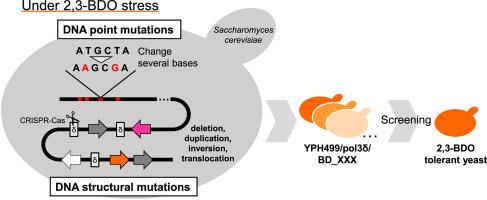Journal of Bioscience and Bioengineering ( IF 2.3 ) Pub Date : 2020-12-01 , DOI: 10.1016/j.jbiosc.2020.11.004 Asuka Mizobata , Ryosuke Mitsui , Ryosuke Yamada , Takuya Matsumoto , Shizue Yoshihara , Hayato Tokumoto , Hiroyasu Ogino

|
Although the yeast Saccharomyces cerevisiae has been used to produce various bio-based chemicals, including solvents and organic acids, most of these products inhibit yeast growth at high concentrations. In general, it is difficult to rationally improve stress tolerance in yeast by modifying specific genes, because many of the genes involved in stress response remain unidentified. Previous studies have reported that various forms of stress tolerance in yeast were improved by introducing random mutations, such as DNA point mutations and DNA structural mutations. In this study, we developed a novel mutagenesis strategy that allows for the simultaneous performance of these two types of mutagenesis to construct a yeast variant with high 2,3-butanediol (2,3-BDO) tolerance. The mutations were simultaneously introduced into S. cerevisiae YPH499, accompanied by a stepwise increase in the concentration of 2,3-BDO. The resulting mutant YPH499/pol3δ/BD_392 showed 4.9-fold higher cell concentrations than the parental strain after 96 h cultivation in medium containing 175 g/L 2,3-BDO. Afterwards, we carried out transcriptome analysis to characterize the 2,3-BDO-tolerant strain. Gene ontology enrichment analysis with RNA sequence data revealed an increase in expression levels of genes related to amino acid metabolic processes. Therefore, we hypothesize that the yeast acquired high 2,3-BDO tolerance by amino acid function. Our research provides a novel mutagenesis strategy that achieves efficient modification of the genome for improving tolerance to various types of stressors.
中文翻译:

通过使用新型诱变策略提高酿酒酵母中的2,3-丁二醇耐受性
虽然酵母酿酒酵母已用于生产各种生物基化学品,包括溶剂和有机酸,其中大多数产品在高浓度下会抑制酵母菌的生长。通常,难以通过修饰特定基因来合理地改善酵母中的胁迫耐受性,因为涉及胁迫应答的许多基因仍未被鉴定。先前的研究报道,通过引入随机突变(例如DNA点突变和DNA结构突变),酵母中各种形式的胁迫耐受性得到了改善。在这项研究中,我们开发了一种新颖的诱变策略,可同时执行这两种诱变,以构建具有高2,3-丁二醇(2,3-BDO)耐受性的酵母变体。同时将突变引入啤酒酵母中YPH499伴随着2,3-BDO浓度的逐步增加。在含有175 g / L 2,3-BDO的培养基中培养96 h后,所得突变体YPH499 /pol3δ/ BD_392的细胞浓度比亲本菌株高4.9倍。此后,我们进行了转录组分析以表征2,3-BDO耐受菌株。具有RNA序列数据的基因本体论富集分析揭示了与氨基酸代谢过程相关的基因表达水平的提高。因此,我们假设酵母通过氨基酸功能获得了较高的2,3-BDO耐受性。我们的研究提供了一种新颖的诱变策略,可实现基因组的有效修饰,从而提高对各种应激源的耐受性。











































 京公网安备 11010802027423号
京公网安备 11010802027423号